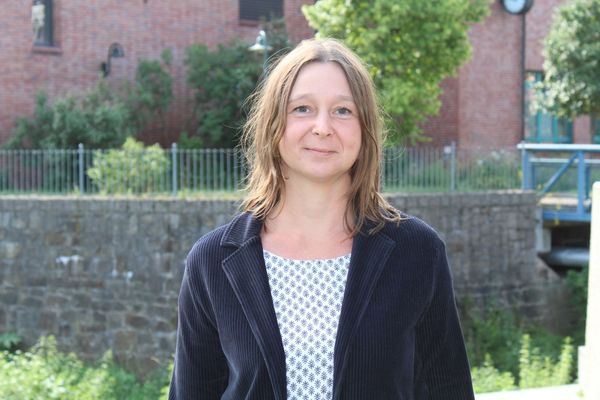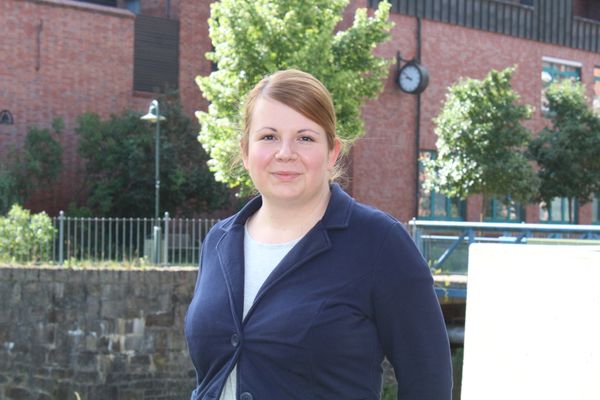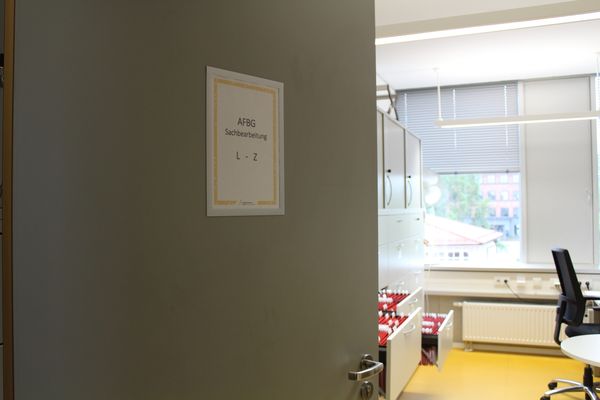Monthly Topic July: Education Grants
State Financial Support for Students and Career Advancement
The Office for Educational Support of the Studierendenwerk Kassel supports students as well as participants in professional advancement programs. The experts provide advice on the Federal Training Assistance Act (BAföG) and the Upgrading Training Assistance Act (AFBG).
- Interview with Julia Thonfeld, Head of the Department of Educational Support at Studierendenwerk Kassel
- Three Questions for Gabrijela Barzinmehr-Franic, Team leader at the BAföG Office of the Studierendenwerk
- "Seek and seize your opportunities" - Studierendenwerk Managing Director Christa Ambrosius on her own BAföG time
- Behind The Scenes of The BAföG Office (Video)
- Three Questions for Andreas Jähn, Advisor at the AFBG Office of the Studierendenwerk
- 50 Years of BAföG
- 25 Years of AFBG
50 Years of Studierendenwerk, 50 Years of BAföG, 25 Years of Assistance for Professionals
In the anniversary year of the Studierendenwerk, the Federal Training Assistance Act (BAföG) celebrates its 50th birthday, and the Upgrading Training Assistance Act for Professionals (AFBG) turns 25. The support team of the Studierendenwerk provides advice on both topics and processes BAföG and AFBG applications. But - are these two stately funding opportunities actually still up to date? Who better to answer this question than an insider. We asked department head Julia Thonfeld.


Hand on heart, Ms. Thonfeld - do you burn for BAföG and AFBG?
Yes - I do. After all, these programs support people who might otherwise not study or advance in their careers. For me, BAföG and AFBG stand for social justice and are enormously important for everyone who wants to advance through education, regardless of their own or their parents' wallets.
We get a lot of feedback that graduation was only made possible by paying BAföG and AFBG.
Students tell us again and again that they are very happy to receive BAföG.
So it's quite important that these funding options continue to exist! ....
Is your assessment supported by the number of applications?
In the case of the AFBG, I can say that there has been a steady increase, while the number of applications for BAföG fell a few years ago and has remained more or less constant since then. This year, the trend in both areas is upward.
So, everything can stay as it is?
No, in view of the high student numbers, the BAföG application figures and also the number of those receiving BAföG could be higher overall.
The students who receive BAföG are happy about it. But of course there are many more students who would also be dependent on BAföG, but do not receive any funding. Therefore, there is still a lot of room for improvement:
The forms that have to be filled out are doable, but not without. Many students respect having to gather the necessary documents - also from their parents. However, the BAföG and also the AFBG have now reacted and there is now a shortened application form for repeat applications. However, it will probably not be possible to streamline the initial applications until the legal basis is changed.
It is also essential that the content of BAföG be adapted to students' lifestyles. For example, part-time studies cannot be supported. And the requirement rates and allowances must be continuously increased. This is where politics is called upon. They must make adjustments so that equal opportunities can be achieved as a goal for BAföG and so that everyone who needs BAföG can receive it.
Incidentally, the Federal Administrative Court also recently ruled that the BAföG requirement rate may be unconstitutional. The decision on this must now be made by the Federal Constitutional Court.
So - depending on how politics intervenes, the number of applications rises and falls?
Yes, students have always needed reliable student funding - whether they get it is up to the politicians. Over the past five decades, we have seen how the switch from full grants to full loans to partial loans has had an immediate impact on the number of applications. My first predecessor in the seventies was already very passionate about making BAföG truly needs-based. Like me, he was absolutely convinced that BAföG was needed.
What advice do you have for students who are not sure whether they should apply for BAföG?
It is always worthwhile to apply! Even if at first glance there may not be any entitlement. Our team is highly motivated and always tries to exhaust all avenues that are available.
We advise on what options are available, even if at first glance there is no BAföG entitlement, or even if the parents cannot provide the necessary information.
Has a lot changed for your team and your work since the early days of BAföG?
Oh yes - for one thing, processing applications has become more demanding. There are hardly any cases that can be reviewed completely smoothly, because students' biographies have become more colorful.
And then increasing digitization changed our work significantly. In the past, for example, there were still so-called registration documents that had to be filled out by hand and transported to Wiesbaden by a courier service. Then, in the mid-1990s, software was introduced that enabled at least partial digital processing of applications. But we received the notices for an entire month as a huge mountain of paper, which we had to sort through and check for errors. Only then could we send out the notices.
And today the mountains of paper are history?
At least they're not as high as they were back then. Since 2012, we have been working in Hesse with software that allows us to send out the notifications directly after processing the applications. But we still work with a lot of paper. At the moment, applications are submitted online, but we don't yet have a digital file, so we still have to print out the applications and documents. But there will certainly be further progress in this respect in the next few years.
If you could craft the ideal funding instrument for students and for career advancement, what would be the most important component?
Both BAföG and AFBG must be regularly adjusted and reliable. Even before the studies or advanced training begins, it should be clear what monthly amount applicants can expect. Anyone who wants to stand on their own two feet and start a course of study or further training needs to know how much money will be paid for the duration of the course or further training. And even more so if the family cannot step in.
BAföG needs to evolve: The German Student Union demands: "Adapt BAföG to the reality of life and study, no longer link the maximum duration of support to the standard period of study, remove age limits, support in the direction of a full subsidy. I can identify with these demands.
There should be more ease in the application process as well. Of course, it would be best if the application process were even fun!
And what about the fun at work?
If you were to ask the team, they would all say that they enjoy their work. That's really good! And that's despite the fact that the workload is already high. So it's very important that the enjoyment of the work remains. Of course, this also means that our work has to be adequately financed.
Numbers
The BAföG and AFBG Team
- A total of 17 employees for case processing, secretariat, team and department management
Applications 2020
- BAföG - 4,798 applications processed, 4,249 recipients
- AFBG - 2005 applications processed, 2,217 recipient


What has been your best moment in your BAföG work?
There have been many great moments over the past few years, so I don't want to commit to one in particular. I am always happy for the students when, after a case that was difficult at the beginning in terms of funding law, BAföG funding finally works out in the end. Often it is not only students who are happy, but also parents who are under massive pressure to enable their child to study, but who are reaching their limits financially. Here there are several ways in the BAföG to take the pressure off the parents and to grant the students education support according to the BAföG.
But also the other way around there are ways and possibilities to get the parents to pay the maintenance. In cases where parents or parents refuse to cooperate or to pay the imputed amount to the students, we can make advance payments upon request and then act as a "maintenance advance office", so to speak. We then subsequently claim the maintenance from the parents. The students can concentrate on their studies and do not have to worry that the monthly payments will stop.
A special affair of my heart is the BAföG advising of international and refugee students. Refugee students in particular have a long way to go: starting with dropping out of their studies in their home country, fleeing to Germany combined with the recognition of their academic achievements to date, the German language course and enrollment at the University of Kassel. If, in the end, they are able to study, the biggest hurdle for these students is often securing their livelihood. And this is where BAföG comes into play: We make it possible for students to receive state funding and thus also pave the way to a successful degree.
Do you actually know all the answers to the questions of "your" students or do you sometimes have to read up on the law?
The question of how high the requirement rate is and how much a student is allowed to earn on top of that, I can figure out without the text of the law. In more complex and rare cases, it is often helpful to look at the law. However, it is not only the Federal Training Assistance Act that is relevant for us. In addition to the BAföG, there are numerous other laws, administrative regulations, ordinances and decrees that are binding for us. Of course, we also keep an eye on current case law and monitor developments. Of course, this often makes our work more difficult, but at the same time it is also exciting.
What would you like to see for BAföG students in the future?
I would like to see BAföG in the future become more lifelike, more flexible and more broadly responsive to the realities of students' lives. It is about time that certain - in my view outdated - points are taken up. Eliminating the age limit and allowing "partial funding" for part-time students are two points that I would find important and true to life. It should also be possible to change at least once in the master's program without completely losing eligibility for funding. Any income and asset limits must be set so that not only a small portion of students can participate. The funding rate is getting smaller from year to year, even though the need is there and will continue to be there. This is what happens when you only make small adjustments over decades, but lose sight of the big picture. I would like to see a fundamental reform of BAföG that would enable current and future students to have a more carefree time at university.


Christa Ambrosius has been the new managing director of Studierendenwerk Kassel since July 1, 2021. She studied political science and economics in Marburg and Hamburg from 1983 to 1989. She financed her studies first with BAföG and later with a scholarship.
Ms. Ambrosius, what was it like for you with BAföG?
I immediately applied for BAföG when I enrolled at university and was very grateful for this basic funding. My parents always supported me and my four siblings financially, and we all studied - so BAföG was an enormous relief for my parents. In addition to my studies, I also had a job.
Were you initially reluctant to apply for BAföG?
Not really. At the time, BAföG was still a full loan and had to be paid back in full within a certain period of time after graduation. Fortunately, there was then the possibility of getting a large part of the debt forgiven by getting good grades and keeping to the standard period of study. I find today's arrangement with a partial loan for all BAföG recipients much more appealing.
And the paperwork?
(laughs) It wasn't as bad as I had feared, and it was well worth it. I simply saw it as an investment in my professional future - and as you can see, it paid off.
What advice do you have for students today with regard to financing their studies?
Don't be deterred! Neither by debts and forms nor by the financial situation of the parents. It is always worthwhile to submit a BAföG application and to sound out the best individual financing mix with the advisors. In addition to BAföG, there are other financing options that are particularly interesting for international students and career changers - such as scholarships or student loans. Even if you want to study abroad yourself, there are good financing options available today that I would have liked to have used back then.
So my motto is: seek and seize your opportunities, courageously go your own way.
What happens once the applications have been submitted? Our team explains it in the video and encourages all students to apply.
Soon the video will be available with english subtitles - until then we kindly ask you for a little patience.


You are an AFBG Advisor with heart and expertise - why is that so important to you?
The Upgrading Training Assistance Act is a great instrument. It ensures that highly motivated people who would otherwise not be able to afford further training go their own way. They get financial security for their qualification - like BAföG for students, Aufstiegs-BAföG contributes to social justice for non-academic professions. In my advising sessions, I repeatedly experience the enthusiasm of the applicants. And that infects me, too.
Do you sometimes struggle with the forms?
You bet I do. I'm a lateral entrant myself and often have to read up on the details. The individual regulations are very different depending on the training. I really learn something every day so that I can advise and support applicants in the best possible way.
Do you have any tips for your AFBG Applicants?
The best tips I can give: Submit your application as early as possible - then we have enough time together to clarify any unanswered questions. Read the forms carefully and thoroughly. Only then will you discover in good time which documents you need for the application and be able to compile them in advance. And if the application is complete right from the start, the money will be in your account faster...



